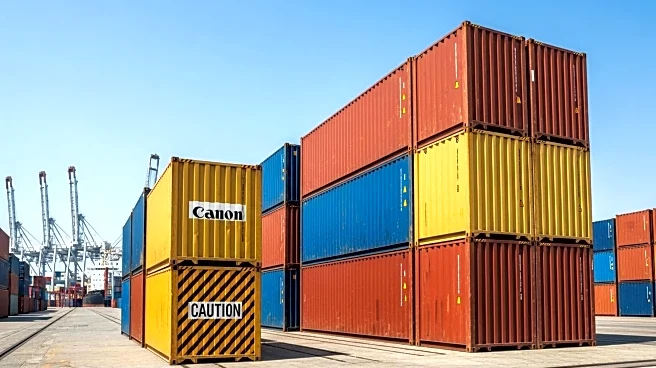What's Happening?
The World Shipping Council (WSC) has released new data indicating that over 11 percent of containers inspected by port state inspectors have safety deficiencies. This marks an increase from 11 percent in 2023 and highlights ongoing issues with mis-declared and improperly packed cargo. The WSC emphasizes that these deficiencies pose significant risks to crews, ships, cargo, and the environment. The report is based on inspections of 77,688 containers, with 8,850 found to have issues. The types of deficiencies include mis-declared dangerous goods, incorrect documentation, and improper packing, which can lead to serious incidents such as ship fires. Recent high-profile incidents, including fires on vessels like the Wan Hai 503 and Marie Maersk, underscore the urgency of addressing these safety concerns.
Why It's Important?
The increase in container safety issues is a critical concern for the maritime industry, which relies heavily on the safe transport of goods. These deficiencies can lead to catastrophic incidents, endangering lives and causing significant economic losses. The maritime industry is a vital component of global trade, and safety issues can disrupt supply chains, affecting businesses and consumers worldwide. The WSC's call for stronger safety measures and increased reporting is crucial to mitigate these risks and ensure compliance with international regulations. Addressing these issues is essential to maintaining the integrity and reliability of maritime transport, which is fundamental to the global economy.
What's Next?
The World Shipping Council is advocating for enhanced safety measures and more comprehensive reporting from port states. Currently, only seven port states are reporting cargo safety data, which limits the industry's ability to identify trends and address problems effectively. The WSC's push for more data collection and analysis aims to provide insights that can lead to improved safety protocols and regulations. As the industry continues to face challenges with mis-declared and improperly packed cargo, stakeholders may need to collaborate on developing new standards and technologies to ensure safer shipping practices.
Beyond the Headlines
The ongoing safety issues in container shipping highlight broader challenges in the maritime industry, including regulatory compliance and the need for technological advancements. The ethical responsibility of shipping companies to ensure the safety of their operations is paramount, as failures can lead to environmental disasters and loss of life. Long-term solutions may involve investing in better training for personnel, adopting advanced tracking and monitoring systems, and fostering international cooperation to standardize safety practices across borders.











